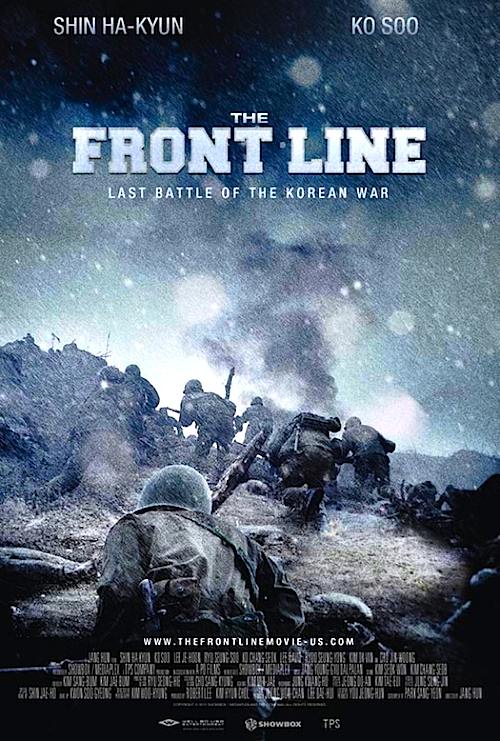By Joe Bendel. When a South Korean officer is killed with one of his troops’ weapons, someone has to investigate. It is also a convenient way to move a trouble-making lieutenant out of the way. Indeed, war is brutal, messy, and soul-deadening in Jang Hun’s The Front Line, Korea’s official best foreign language Oscar submission, which opens this Friday in New York.
A vocal critic of the drawn-out peace negotiating process, Kang Eun-pyo is assigned to investigate irregularities reported within the “Alligator Company” dug-in around the pedestrian looking but strategically prized Aero.K hill. In addition to the suspicious death of a despised commander, several letters from North Korean soldiers have been posted to family members in the south by someone in the company. A mole is suspected.
However, when Kang arrives, he discovers the situation is murkier than that. There has been a form of communication flowing between the two sides, but it is born of survivors’ fellowship rather than espionage. Still, he maintains suspicions regarding Kim Su-hyeok, a comrade from the early days of the war long presumed to be a POW, but evidently serving as the Company’s lieutenant.
 Over the course of the film, Alligator Company will take, lose, and regain the fateful hill over and over again. It would get somewhat repetitive if not for the intense warfighting scenes, rendered by Jang in a take-no-prisoners style. Line’s sense of place is so strong, audiences will feel they know every inch of that crummy nub of a hill.
Over the course of the film, Alligator Company will take, lose, and regain the fateful hill over and over again. It would get somewhat repetitive if not for the intense warfighting scenes, rendered by Jang in a take-no-prisoners style. Line’s sense of place is so strong, audiences will feel they know every inch of that crummy nub of a hill.
Do not get too attached to any characters in Line. Jang will call up their numbers at the most arbitrary of times, as befits the nature of war. Nonetheless, there are many strongly delineated characters. In fact, the self-medicating Captain Shin Il-yeong and the darkly brooding Lt. Kim, memorably played by Lee Je-hoon and Ko Soo respectively, clearly bear the spiritual scars of war. As the film’s only substantial female character, Kim Ok-bin also hints at a host of inner conflicts as the soon-to-be not so mysterious woman often seen foraging near the battlefield.
Like Jang’s previous film Secret Reunion (which screens February 15th in New York as part of the Korean Cultural Service’s regular cinema showcase), Line not very subtly advocates for reunification, arguing that divisions are merely an arbitrary matter of hills and parallels. Of course, it ignores the grim reality of the DPRK, in which famine is commonplace and the gulags are so extensive that they are the only features of the country that can be seen from space. While the soldiers could easily lose sight of it in the carnage surrounding Aero.K, there were indeed real stakes and consequences to the war. Whether it was also prosecuted competently, is an entirely fair and separate question.
Regardless, Jang masterly stages some of the most realistic, decidedly unheroic battle scenes viewers will see at the theater this year. It is a powerful, draining statement, recommended for connoisseurs of war movies, including the anti-war variety. Line opens this Friday (1/20) in New York at the AMC Empire and in the Bay Area at the AMC Cupertino.
Posted on January 19th, 2012 at 9:04am.